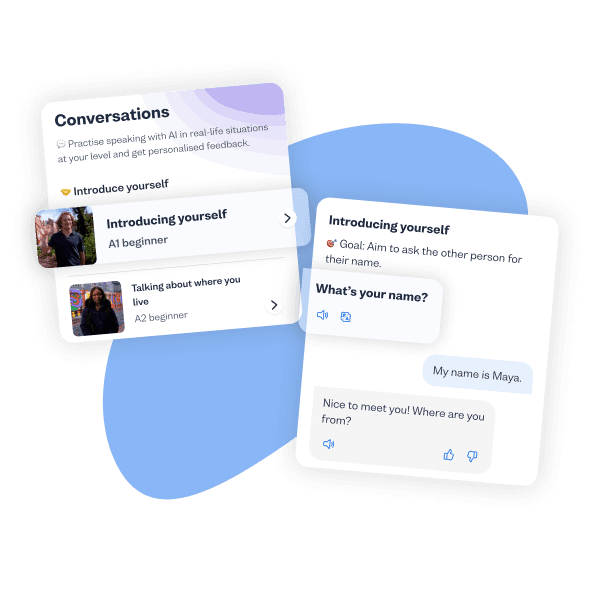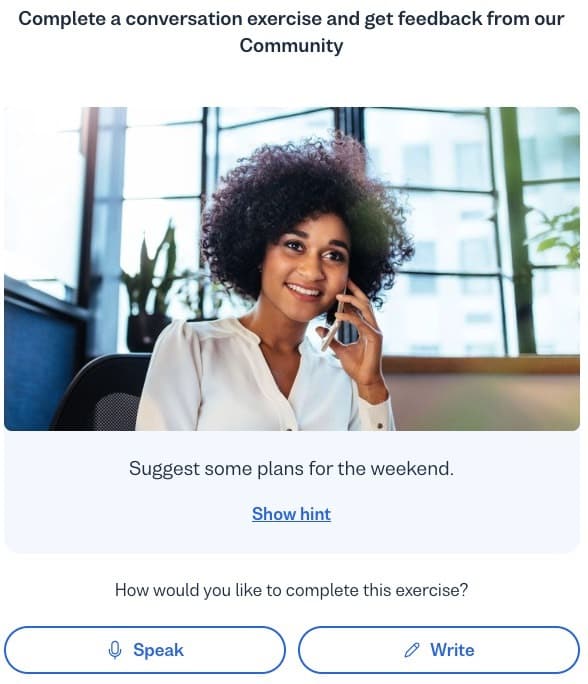I want to learn...
Author:

Emily Duncan
If you’re learning to speak English, you’ll want to find as many opportunities as you can to get English conversation practice. After all, communicating with others is a big part of why we learn a new language. And it’s important to get English practice to build your confidence.
There are many ways to improve your English conversation skills in person and online, and many skills you can build to help you speak English more clearly and naturally, even if you only have a few minutes or are learning on the go.
In this guide, we’ll discuss how you can put books, TV, and online tools to work to help you learn the language, and easy ways you can get English speaking practice with and without other people.
So, without further ado, here are our 15 top tips to help you practice English.
15 English speaking practice tips
Put a mix of these English conversation practice ideas to work and you’ll quickly build your English vocabulary, grammar, pronunciation, and confidence.
1. Make practice a habit
Many studies have been done over the years on the effects of frequency and usage in language learning. Broadly speaking, making time daily for review, lessons, or English conversation practice – even if it’s just 5 minutes – can help with recall and add to the total amount of time you’ve spent learning and using the language.
No matter how you choose to learn, we recommend setting aside a specific time and building English practice into your day to help speed your progress. For example, you could start learning while you make your morning coffee or on your commute home. By tying your English practice to an existing routine, you can make your routine more fun and help nudge yourself to stick to it.
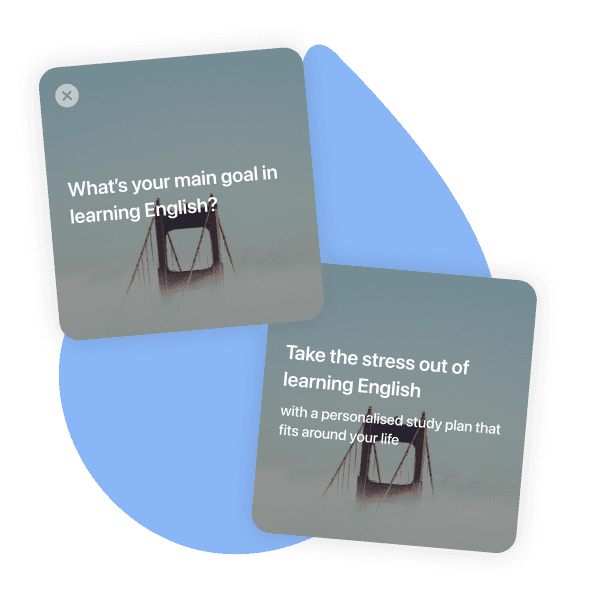
2. Put English movies and TV shows to work for you
This is a technique we recommend for people who want to use anime to learn Japanese – but it works just as well with English or any other language! Pick a favorite English-language show and watch it with and without subtitles until you know what’s being said at each turn. Look up any unfamiliar vocabulary and phrases – and remember, the subtitle translation isn’t always word for word. Bonus points if you can catch all the differences by the time you’re done!
For a less time-consuming exercise, you can also simply take note while watching your favorite English language programs when they say words you recognize and make a list of the words you don’t.
You can also get English pronunciation practice by mimicking different characters. Pay attention to the use of contractions and sound linking. Just remember that not everyone on TV is someone you’ll want to emulate in daily conversations!
3. Talk to yourself in English
If you’re tight on time, this is an easy one to do, anytime, anywhere. Narrate your day to yourself in English! As you get ready, remind yourself the names of the items you need in English – and do it out loud.
Overcoming the hurdle of speaking a new language out loud can be tough for a lot of language learners. The more you practice speaking English to yourself, the easier it’ll be to take the leap when you want to speak to someone else.
When you learn with Busuu, you’ll be prompted to record yourself repeating new phrases and answering prompts! It’s a great way to start speaking English more in a low pressure environment.
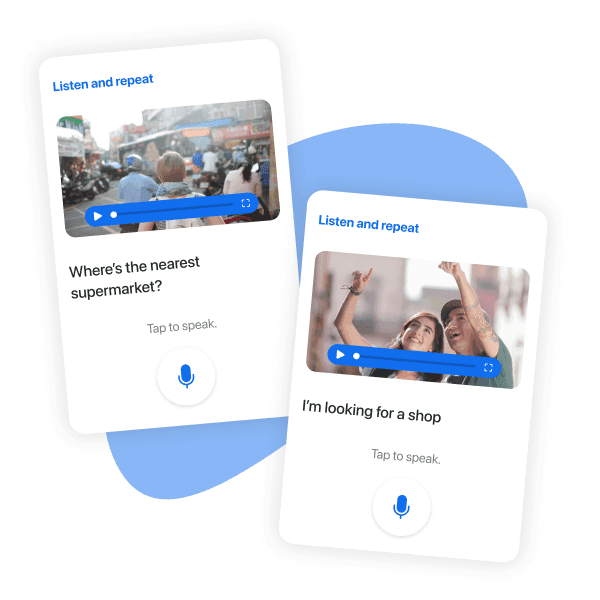
Pro Tip: Want to practice speaking English in public but feeling self conscious about talking to yourself? Here’s a tip received from a college language professor. Simply put your headphones on or hold the phone to your ear and start a one-sided conversation. No one needs to know there’s no one on the other end of the line!
4. Listen back to your exercises
Sometimes it can be hard to assess your progress when learning a new language. To help you hear what you’re doing and improve your spoken English, try recording yourself speaking and listening back. Many learners find it easier to identify where they’re not quite hitting the mark when they’re not actively speaking.
You can also use recordings to see how far you’ve come (yay!) and to give yourself personalized study tools to listen to on the go.
When you learn with Busuu, our Smart Review features automatically capture words and phrases that you’ve stumbled on in the past, so you’ll be able to quickly grab items to record for yourself.
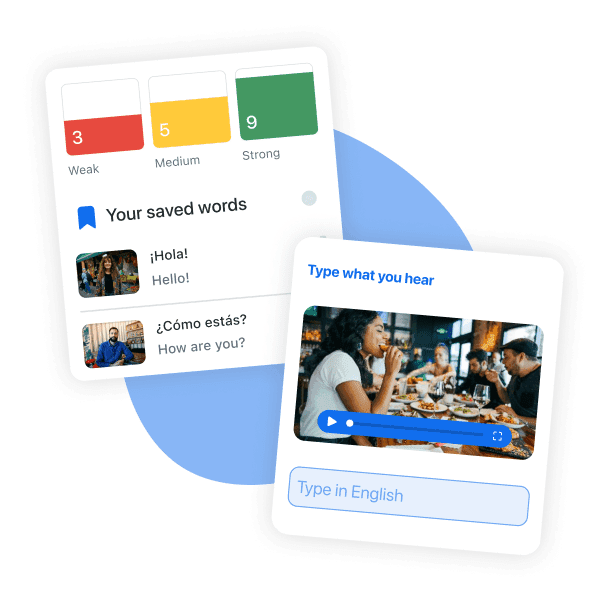
5. Don’t fear the power of the internet
Social media is incredible – there are many, many people making fun and informative language-learning content (check out Busuu's TikTok on your mobile or desktop). Plus, social media gives you so much access to native English speakers (or speakers of any language you choose to learn). Use it to your advantage!
Check out how native English speakers talk to each other. Reply to comments in English. And try making English-language content of your own – even if you never post it. It’s an easy way to practice English speaking online free.
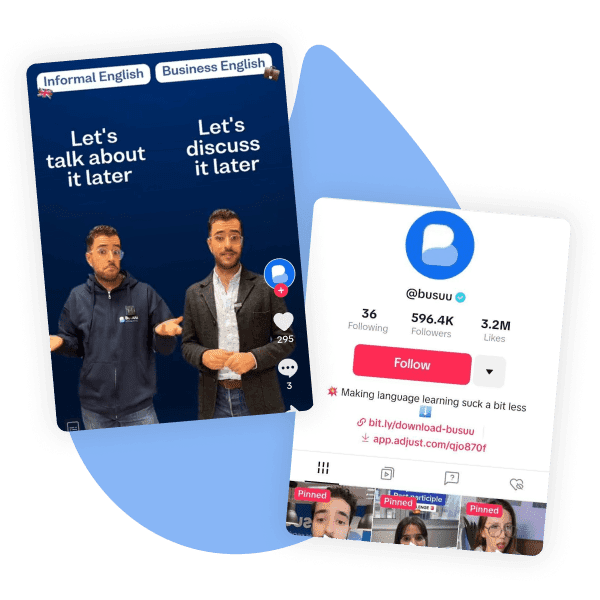
6. Drill dialogues
Listening to dialogues and using dialogue exercises can help you improve your listening skills in English. Hearing native speakers chat can help you improve your accent and speed up your listening comprehension time (which makes a big difference when trying to make conversation in English or any language!).
We recommend using dialogue exercises that are related to what you’re learning, where you can hear the words spoken, see them written, and then see them translated into your native language all at once. Oh, and that just happens to be exactly how we work dialogues into our English course on Busuu.

7. Take advantage of online courses (like Busuu!)
This might be sitting at number 7, but in many ways it’s our top tip: if you’re learning English and looking for English practice, taking a structured course designed by experts will give you a big leg up. For example, you can learn English for free on Busuu and get tons of content designed with learners like you in mind.
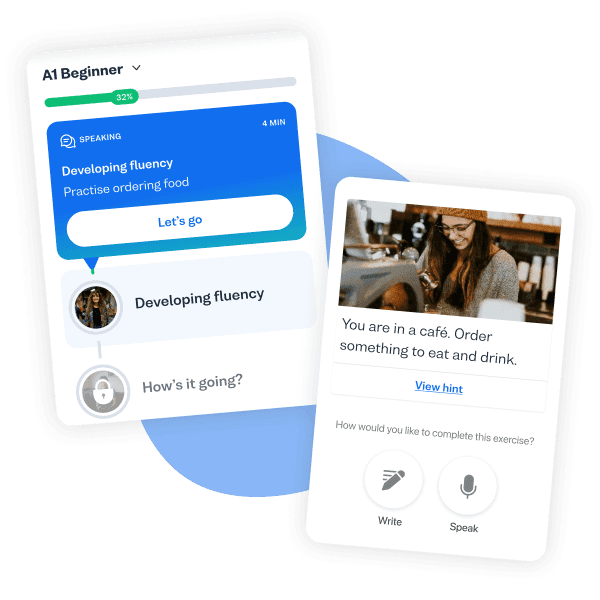
Books and TV and social media can get you so far, but studies show that learners who don’t get structured grammar lessons have a much harder time mastering speaking and writing in their new language.
On that note…
Now back to your regularly scheduled programming.
8. Build your vocabulary with books
A great way to build your vocab and get English reading practice is by reading English books. Books are an entertaining way to build your vocabulary and grammar knowledge, and there’s something out there to fit every reading level.
Don’t be afraid to challenge yourself with different genres and time periods, this can help deepen your understanding of both the English language and English-speaking cultures. Just be sure to look up unfamiliar words as you go so you don’t miss something big!
9. Chat with AI assistants
If you want to learn to speak English fluently, you need as much English speaking practice as you can get, but finding a practice partner can be tough. Fortunately, AI-powered chatbots like Alexa, Siri, and ChatGPT are always around if you want to start a written or spoken conversation. Sure, they might struggle to understand your spoken English at first (bummer), but that can be a good push to figure out how to adjust your English pronunciation.
Similarly, setting your computer, phone, or other devices to English can help you effortlessly add a little English practice into your day -to-day life. Just make sure you know enough of the major words and phrases you need to use the device smoothly before switching over!
10. Work with a teacher or tutor
Another great way to improve your English is by learning with a teacher. After all, there are some things it’s simply easier to learn from the professionals.
While you may not be able (or want) to jump into a college course tomorrow, that doesn’t mean you can’t take lessons with a qualified English teacher. If you’re struggling, finding a qualified language teacher in person or online (check out Verbling) can make a huge difference, even if it’s only for a few lessons. This is especially true if you need English grammar practice or want to practice speaking English in real time with professional guidance.
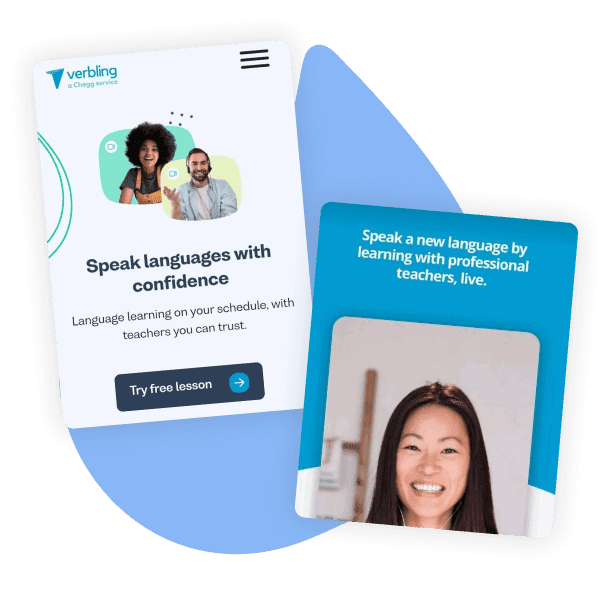
11. Use the news to your advantage
While many courses cover the basics in their vocabulary lessons, it can be challenging to find lessons based around current events and social movements. Fortunately, many news sites now offer both audio or video and written versions of their articles.
Find news and podcasts relevant to your interests and take note of vocabulary and pronunciation. There's a ton of English-language content targeting English speakers that can help you learn words and ideas you’re unlikely to find in a textbook. This is also a good way to discover English technical terms in your industry if you’re learning English for work! Repeat phrases and terms out loud and try responding to podcasts like you’re in the conversation for some professional English speaking practice.
Learning English with Busuu, this is built into your studies with lessons featuring content from The New York Times and The Economist!
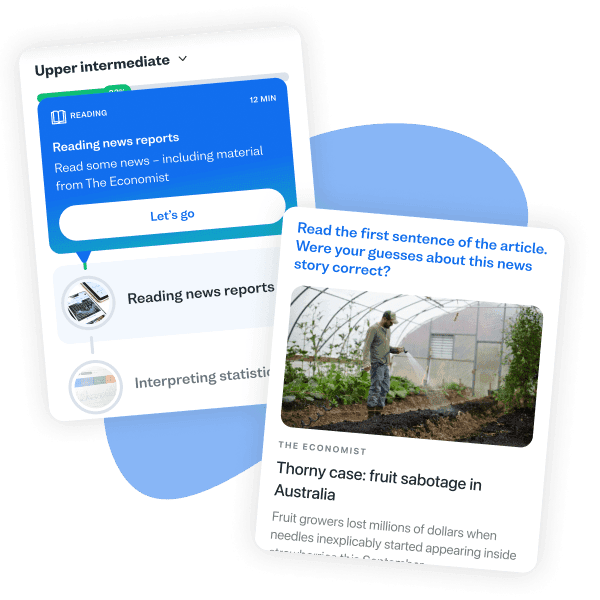
12. Learn on the go with music (carefully)
As well as audio news and podcasts, you can also get English listening practice on the go with English-language music. Music can help you master slang and become accustomed to English poetry and metaphor.
That said, slang or vernaculars can, of course, be tricky to use correctly in a new language – make sure you know exactly what you’re saying (and what situations it’s appropriate for, if any…) before trying out new phrases you hear in songs for English speakers.
You can also learn on-the-go with Busuu, since the mobile app allows you to learn from anywhere, and with Busuu Premium, you can download lessons to keep learning even when you don’t have an internet connection.
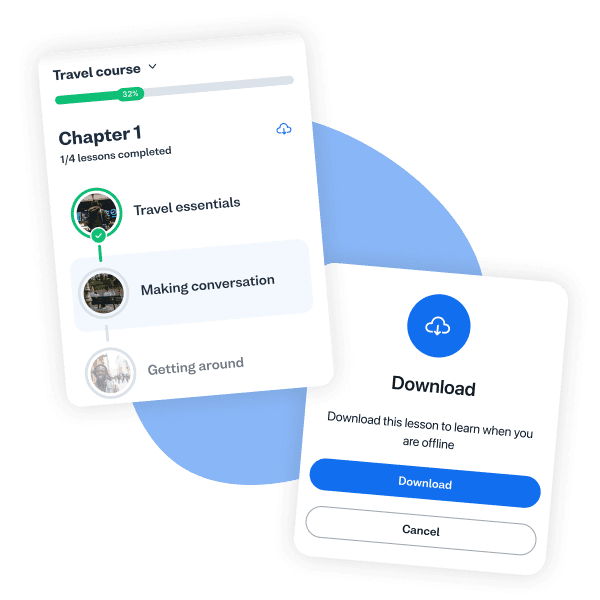
Which reminds us! Another great way to learn casual English the way people really use it, while avoiding pitfalls?
13. Get feedback from native speakers the easy way
Language learners always benefit from interacting with native speakers of their new language. After all, when you are learning a new language, getting feedback from people who actually speak the language and use it every day is very helpful. Books can teach you vocabulary, but humans are best when you need to learn how the language is actually used in the real world.
That’s exactly where Busuu’s Community Corrections comes in.
On Busuu, you get direct feedback on your exercises from native English speakers. Sure, computers can tell you what’s technically correct (and yes, we do that too!), but our lovely community of language learners makes all the difference for those looking to practice English conversation skills and get feedback on authentic pronunciation and word usage.
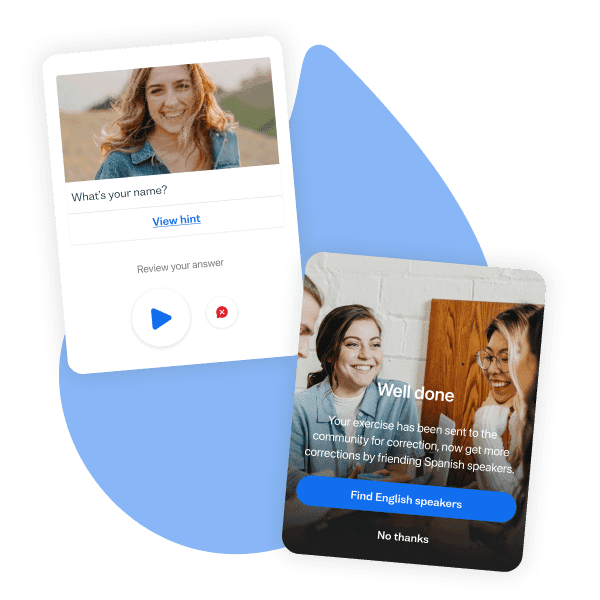
14. Commit to an ESL test
Some people need a deadline to really make progress. If you’re having trouble making time to practice your English, putting a hard date on the books to take a test – or setting a deadline for yourself to complete a certificate-level course – may be just the motivation you need.
When you learn with Busuu, courses are broken down into levels based on the Common European Framework of Reference (CEFR), so even if you’re not ready for a formal test, you can choose dates to aim to complete different levels and create a Study Plan to help meet those goals.
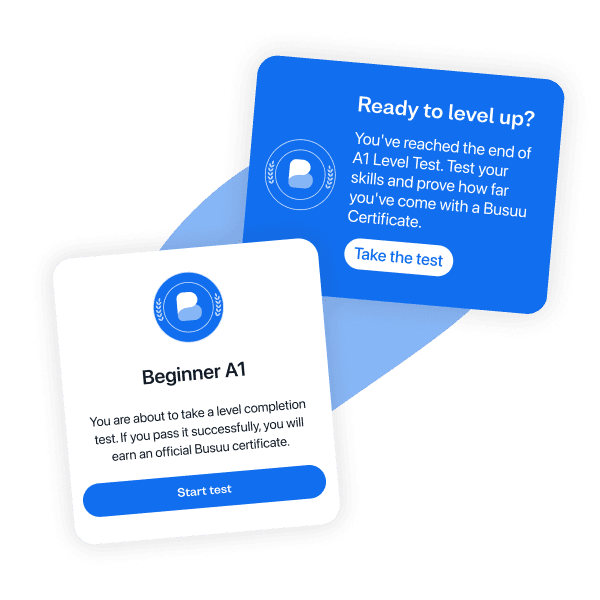
15. Take the leap and make conversation
Last but certainly not least, get out there and use your English skills! Don’t worry if they’re not perfect, stumbling a little is part of learning. You can get English conversation practice with the new Busuu Conversations feature, or through travel, going to English-language or ESL events, finding an online study buddy, or practicing with friends and family.
If you have friends or family members that speak English, they might not guess that you want to practice with them. Be brave and ask them to speak to you in English! They can be a great support and offer instant feedback. The more you start speaking in English on a regular basis, the easier it’ll be and the faster you’ll learn.
Conversational English topics and phrases for every level
Now we’ve covered how to practice. But what exactly should you be practising? Here are a few topics that make sense for learners to use to practise English conversations, grouped by A1 (beginner), B1 (intermediate), and B2 (advanced) level subjects.
Basic English conversation topics for beginners
Introducing yourself – hello, how are you, my name is, I am from…
Jobs (basic)
Pets
Favourite foods
Family members
Intermediate English conversation topics
What’s going on at work
Shopping
Weather
Vacations and travel
Comparisons
Advanced English conversation topics
Advanced job topics, business
Frustrations and fears
Politics and news
Sports and culture
Mental health
Now that we’ve covered all of our tips to take your English from so-so to so swell, all that’s left to do is take your learning to the next level!
AUTHOR

Emily Duncan
Newlanguages

